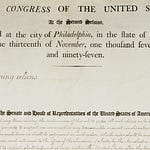The suspension of habeas corpus.
I welcome Professor John Yoo, a senior research fellow at the Civitas Institute, distinguished visiting professor at the School of Civic Leadership at the University of Texas at Austin, as well as the Emmanuel Heller Professor of Law at the University of California at Berkeley.
It is April, 1861. President Abraham Lincoln suspends habeas corpus in accordance with the Suspension Clause of the Constitution (in the event of “rebellion or invasion”).
The Privilege of the Writ of Habeas Corpus shall not be suspended, unless when in Cases of Rebellion or Invasion the public Safety may require it.
U.S. Const. art. I, § 9, cl. 2
However, there begins the argument. Let us look to what happened in 1861 as a guide for what may be ahead of us here in the 21st century, if and when the Trump administration moves through with its thinking, to suspend habeas corpus in order to avoid the necessary due process for those being deported in these next two years.
The Suspension Clause, “rebellion or invasion”? Now we come to what went wrong. Chief Justice Roger B. Taney, infamous for the Dred Scott case—however, he stands up against his president. What is Mr. Taney's case? What is Mr. Lincoln's case?
LINKS:
“Suspending Habeas Corpus: A Lincolnian Guide” by John Yoo on Civitas Outlook
The John Batchelor Show on Apple Podcasts:
The opinions expressed on this website and on The John Batchelor Show are those of John Batchelor and guests, and not those of CBS News.














Share this post